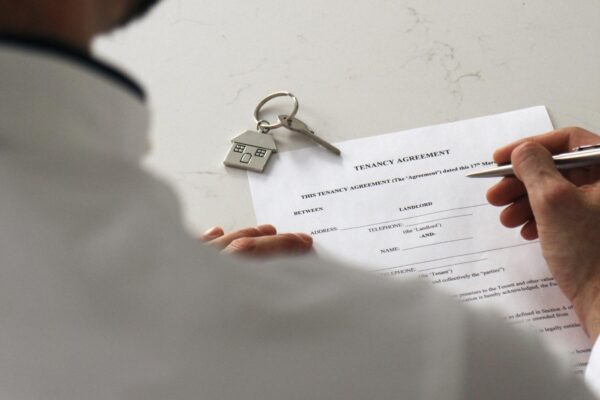It’s common. There’s no shame. When it’s time to write out a new contract, most landlords and agents just change the dates and names on the old one, hit ‘send’ and wait for the tenants to sign.
Given this, isn’t it insane that some agents charge £450 for a new tenancy agreement? For printing off an old contract? Truly crackers. But this isn’t what this post is about.
Landlords need to be aware that clauses from their old contract may now be illegal — and that by using the same contract template as a tenancy that was originally written in 2010, you may be including dodgy clauses without even realising.
Dodgy clauses which could get you in a lot of trouble…
Clauses Landlords Are No Longer Allowed to Include in Tenancy Agreements
Here are the most common examples of clauses that still creep into tenancy agreements despite being banned by recent legislation.
Cleaning Fees
A very popular clause to include requires tenants to pay for professional cleaning of the property at the end of the tenancy. But this is not allowed. If your contract has this clause in, take it out!
Tenants must return the property in as good a condition as it was when the tenancy began, excepting wear and tear. The condition of the property includes its cleanliness. But that doesn’t mean the landlord can require the tenant to pay money for professional cleaning.
If you care about your property being cleaned to a professional level when the tenants move out, the only way to ensure this is to conduct an inventory at the start of the tenancy which describes the property as ‘cleaned to a professional standard throughout’, have the tenants agree in writing that the inventory is accurate, and then conduct another inspection when they move out.
If the property is not up to that standard, then you can attempt to deduct money from their deposit to pay for cleaning, but you may not succeed if the tenant disputes this claim and the deposit adjudicators agree with them.
Late Rent Fees
Before the Tenant Fees Act, it was common for landlords to include punitive fees for tenants who pay their rent late. For example, a fine of £10 per day overdue. If this was ever a fair and enforceable clause, it certainly isn’t now. The Act has limited late rent fees to 3% annually, plus the Bank of England base rate.
In reality, given record low interest rates, this means tenants have to pay very little in the way of late fees, even if they are in many months of arrears.
Renewal Fees
Charging a small fee for the admin involved in renewing a tenancy was the done thing but five years ago. Now, it is prohibited by law. If your contract includes any renewal charge to the tenants, you had better get out the tipex.
When creating a new tenancy, landlords are not allowed to charge anything but rent in advance, a refundable holding deposit and a refundable tenancy deposit. Charging for admin, postage and time is not allowed, even if it was included in a contract you signed with the tenants when it was still legal to do so. The TFA has banned this.
Deposit Is over the Maximum Value
Rental contracts usually include the agreed deposit value on the first page. Deposits are often some multiple of the rent, so if you are not changing the rent you may not even think to touch the clause describing the deposit.
But you should. Deposits have been capped at a maximum value equal to five weeks’ of rent. That means if you took a two-month deposit in 2017 and you are renewing your contract today, you need to refund any deposit amount that is over five weeks’ rent. Landlords frequently forget about this clause, but it could put them at risk of a large fine.
Get an Automatically Up-to-Date Contract for Free
Landlords who use OpenRent can renew their tenancy for free. We give you an up-to-date contract, including all recent law changes, at no cost when you renew.
Goodbye, risk of fines and embarrassing out-of-date clauses. Hello to easy tenancy setup.




Thanks for this Sam, I need to put something in the AST about cleaning to a professional standard.
More broadly, I’ve been having some problems with editing the AST generated by Openrent. For instance I need to put in a clause saying that not only is the tenant who failed referencing supposed to pay six months in advance; they will also need to pay a second payment of six months. (It won’t revert to monthly unless they pass referencing, because the risk remains the same.) I understand standard practice in lettings is for the second payment to be payable two months prior to the second set of six months, which relates to Section 21. It would be helpful if the editing could take place in a WYSIWYG environment for simplicity - I need to remove any mention of monthly rental payment amounts.
I would not advise you to insert any clause into a tenancy agreement unless you are legally trained as it can have adverse effects. In particular, what you are trying to do will likely make the period of the tenancy 6 months, which would mean that any notice you serve will be 6 months minimum even in normal times.
I take on board what you say about the risks of altering the contract.
My issue is, having agreed with the tenant’s suggestion that they cover my risk by paying six months in advance at the start and again before the middle of the year, I can’t edit the contract to reflect that. I don’t believe this is such an uncommon clause that it shouldn’t be possible to change it - again, at my own risk.
OpenRent has updated its guidance to confirm certain parts of the contract can’t be changed. Seems silly to allow custom clauses but not make the whole thing editable. How do I make changes to the contract? – Help Centre
If you are taking lump sums you are at risk when it comes to serving s21.
You need to take five months and a month not six months. On the contract the last month payment should read as one month
When we go back to pre-pandemic legislation, if we ever do, you don’t want to not be able to serve notice because the periodic term is not compatible with the notice period of a s21
You could draft an addendum to state that 6 months rent is payable in advance and that this represents 6x1 monthly payments and at the end of this period a further advance payment of 6x1 monthly payments will be due. I have no idea whether a court would recognise this clause. My feeling is that they possibly wouldn’t. If they didn’t then they might declare the period to be 6 monthly. Worst case scenario they deem at least one of the advance payments to be an unprotected deposit and make you pay a penalty of 3x its value, although that is perhaps less likely. You should really take legal advice before doing this.